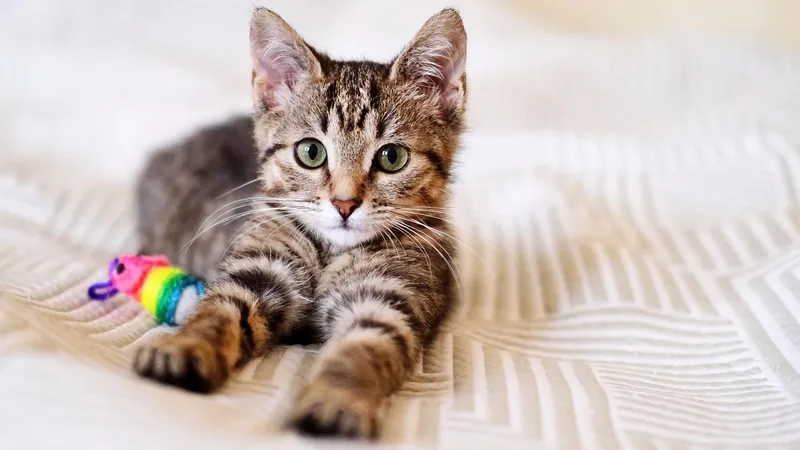
Urgent Warning: Raw Cat Food Linked to Deadly Bird Flu - Here's How to Keep Your Feline Safe!
2025-01-14
Author: Ming
Urgent Warning: Raw Cat Food Linked to Deadly Bird Flu - Here's How to Keep Your Feline Safe!
Recently, a troubling incident involving raw cat food has grabbed the attention of pet owners nationwide. A specific product from Northwest Naturals has been recalled due to contamination with the avian influenza virus (H5N1), leading to the heartbreaking death of an indoor cat believed to have contracted the virus exclusively from the contaminated food.
In a press release, Dr. Ryan Scholz, the State Veterinarian for Oregon Department of Agriculture, confirmed the connection. "We are confident that this cat contracted H5N1 by eating the Northwest Naturals raw and frozen pet food," he explained. Genetic testing showed that the strain of the virus found in the cat matched that in the recalled product precisely, raising alarms across the pet community.
The recalled item is the 2-pound Feline Turkey Recipe, with "best by" dates of 05/21/26 and 06/23/2026. Following this incident, Los Angeles County took precautionary measures by warning pet owners against products from Monarch Raw Pet Food, which also tested positive for the virus. Reports indicated that one house cat tested positive after consuming this product, with the risk extending to others in the same household.
Are Cats More Vulnerable to Bird Flu?
While both dogs and cats can contract bird flu, cats are particularly at risk; the mortality rate for infected felines hovers around a staggering 67%, according to the University of Maryland’s School of Public Health. Yet, infection remains rare, and there are protective steps pet owners can take to shield their furry friends from this threat.
How Do Pets Catch Bird Flu?
Bird flu typically spreads through an infected animal's saliva, mucus, and feces. The infectiousness of the virus is significantly influenced by environmental factors. Dr. Athema Etzioni, a veterinary clinical pathologist, stated, “If it's fresh and moist, moisture can increase the viability of the virus." Exposure can also occur when pets come into contact with infected birds or consume raw food products that harbor the virus.
Cooking pet food to safe temperatures—165 degrees Fahrenheit for poultry—can effectively eliminate any risk of bird flu contamination.
How to Safeguard Your Pet from Bird Flu?
To protect your beloved cat, it’s strongly advised to keep them indoors, significantly reducing their chances of interacting with wild birds or other animals. Experts, including Dr. Etzioni, caution against raw food diets, as they can pose a heightened risk for avian influenza infection.
Currently, there is no vaccine available for cats against this virus, so prevention is vital.
Recognizing the Symptoms of Bird Flu in Pets
Should the virus infect a pet, signs can include lethargy, loss of appetite, and eye inflammation with discharge. Neurological symptoms, such as circling, seizures, and incoordination, may also manifest. If you suspect your pet has contracted bird flu, it is crucial to reach out to your veterinarian immediately. Inform your vet about the potential bird flu infection prior to arrival to ensure proper safety measures are taken for them and other pets.
While the Centers for Disease Control and Prevention (CDC) indicate that the risk of contracting bird flu from your pet is very low, it’s essential to remain vigilant and monitor your health should your pet become infected.
In light of these revelations, it’s more important than ever for pet owners to be informed and proactive in safeguarding their animals against the risks posed by bird flu. Keep your furry friends safe, and always consult with your veterinarian for guidance on proper diet and health care practices!





 Brasil (PT)
Brasil (PT)
 Canada (EN)
Canada (EN)
 Chile (ES)
Chile (ES)
 Česko (CS)
Česko (CS)
 대한민국 (KO)
대한민국 (KO)
 España (ES)
España (ES)
 France (FR)
France (FR)
 Hong Kong (EN)
Hong Kong (EN)
 Italia (IT)
Italia (IT)
 日本 (JA)
日本 (JA)
 Magyarország (HU)
Magyarország (HU)
 Norge (NO)
Norge (NO)
 Polska (PL)
Polska (PL)
 Schweiz (DE)
Schweiz (DE)
 Singapore (EN)
Singapore (EN)
 Sverige (SV)
Sverige (SV)
 Suomi (FI)
Suomi (FI)
 Türkiye (TR)
Türkiye (TR)